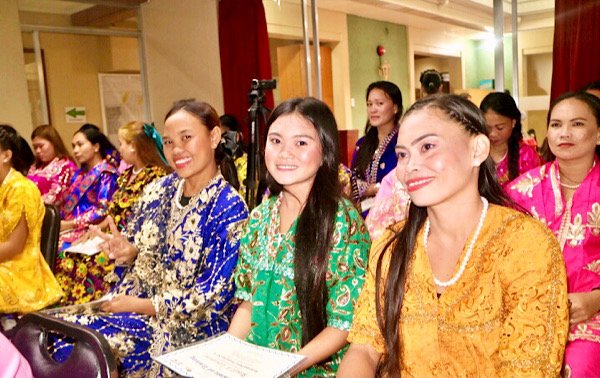The Badjao, or Bajau (man of the seas), is one of the Philippines’ indigenous peoples, whose culture and livelihood are tied to the sea. A tribal community of sea gypsies (so-called since they move with the wind and the tide aboard their small houseboats or "vintas"), they inhabit the waters and shores of the Sulu archipelago at the southwestern tip of the Philippines.
In recent years, Badjao communities have come to settle in Cebu, nearly 600 kilometers northeast of Sulu. Many live in challenging conditions. Their job opportunities are limited due to deficient education and skills.
On average, Badjaos don’t stay in school for more than six months. They grow up as sea nomads, constantly seeking areas where food is abundant or readily available. Badjao women marry young, which is the main reason they stop schooling.

Skills training for Badjao women
In July 2022, a team from the Nano Nagle Child Care and Learning Center in Cebu City visited Banilad Center for Professional Development (BCPD, a technical-vocational school in Cebu established by members of Opus Dei in 1992). Run by the Presentation Sisters of the Blessed Virgin Mary, the Nano Nagle Center works to uplift the lives of the Badjao communities in Cebu.
“I invited the Presentation Sisters to the school,” BCPD director Beth Lopez says, “and told them that we wanted to help the Badjaos with skills training.” BCPD wanted to start projects for indigenous peoples in Mindanao (southern Philippines) earlier, but the COVID-19 pandemic disrupted their plans.
The Sisters saw that BCPD offered courses in the food service industry that could make a real difference in the Badjao women's lives.
“We then made a proposal to AusAid-Reledev Australia to fund the project,” Beth recalled, “and they immediately approved it.” The Australian nonprofit organization was more than willing to support this poverty alleviation project. Everything fell into place.
After careful selection, 25 scholars (aged 18-40) endorsed by the Nano Nagle Foundation attended sessions in Bread and Pastry Production at BCPD. They had intensive classroom instruction, laboratory sessions, and mentoring all day every Saturday from late September to early December.

All 25 passed the National Certificate Level II (NCII) assessment of the Technical Education and Skills Development Authority in December. Their NCII Certificate qualifies them to work as bakers, assistant pastry attendants, or bakery attendants in prestigious food establishments.
Culminating Activity at BCPD
In the afternoon of January 11, 2023, the 25 Badjao women, dressed in colorful traditional garb, had their graduation ceremony at BCPD. In attendance were the Presentation Sisters, led by Sr. Victoria Embata, the Director of the Badjao Integrated Development Program; Ms. Edwina Martel Quialquial, their program coordinator; and Ms. Angelina Paghubasan of the Department of Social Welfare and Development’s field office for Central Visayas.

Edwina shared that every Saturday, the Badjao women were anxious and fearful about what would happen at home while they were at school, far from their community. They had to take two jeepney rides from the Nano Nagle Center to get to BCPD.
“Some said that, at the start, they found the baking equipment overwhelming,” Edwina recalled.”It was the first time for the majority to see baking laboratory equipment up close, and the prospect of handling them was terrifying.”
But as time went by, things changed.

“School is usually burdensome for the Badjaos, but these women looked forward to Saturdays with excitement,” Edwina said. “BCPD gave them the space to express themselves. It was a liberating experience for them because, in their community, seldom do they make decisions. Their voices are hardly heard.”
Aida (25), married with one child, was one of the Badjao graduates. In her speech, she said that they knew it was a unique opportunity to study. Taking a technical course was something new to most of them.

Aida thanked BCPD for helping them discover that they could still do more in life and that they had more potential. She acknowledged the Nano Nagle Foundation and AusAid-Reledev Australia for their generous and invaluable support.
The highlight of the culminating activity was the graduates' cultural dance, an expression of their joy and gratitude to the school and their benefactors. Wearing their beautiful, colorful garb -- made mostly by hand from traditional dastar fabric -- the graduates delighted their audience with graceful movements, even enticing management and school staff to join them.

Next step: a bakery business
The Aboitiz Foundation, Inc. has partnered with BCPD through the years for women's skills training in Cebu. On the occasion of the formal signing of their 2022-2023 memorandum of agreement, BCPD director Beth talked to them about the project with Badjao women. “The next step is to organize them into an association and to find a partner who could help them to start a bakery business,” Beth explained.
Aboitiz Foundation expressed interest due to the food business of its parent, Aboitiz Equity Ventures, Inc. An enterprise development manager of Aboitiz soon met with BCPD to discuss the construction of a bakery. Beth happily shared that “we had an ocular inspection of the place where the bakery will be built. It will be in Mambaling, Cebu.”
For these Badjao women and the ones who will come after them, the winds of change have brought empowering choices that have made them better-equipped to face life’s challenges. Their journey inspires and gives hope to more women of their tribe.

BCPD, a technical-vocational school in Cebu established by members of Opus Dei in 1992, is set to accept its second batch of Badjao women scholars for school year 2023-2024.
